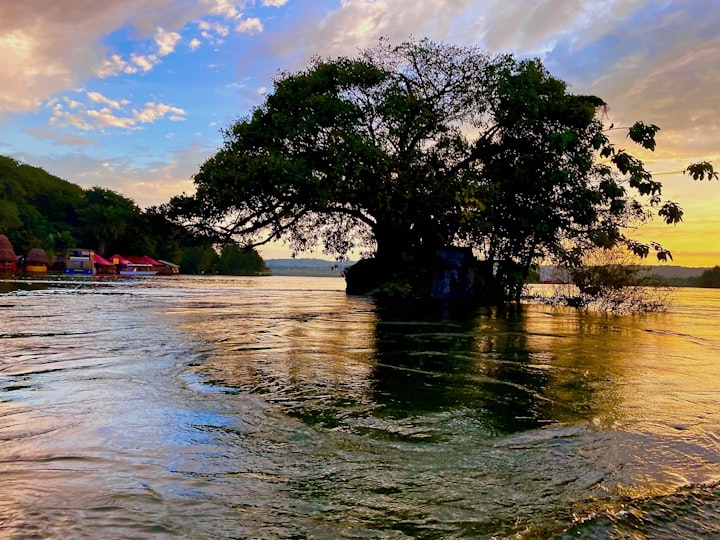The Great American Flood
And Other Tall Tales

Fifteen summers ago when I was fifteen and had no sense of wonder, I visited my grandfather’s farm for the first time. I've gone every summer since, and every summer he tells me a new story about his life. Out of all the possible lives to live, Grandpa Dale has lived them all.
He was a cook, a golf pro, two types of fighter (boxer and soldier), a cruise ship pianist, a shepherd, two types of jockey (discs and horses), and, the strangest to me, a New York City conductor (for bands, not trains). I could never figure how he did all these things and still had time to get married and raise a couple generations. I wasn’t the only one who doubted his stories. Whenever he got going, my grandmother Dahlia would roll her eyes and whisk off to whip up one of her famous desserts—today she wanted apple fritters—talking to herself about “no end to his tall tales."
Even though we doubted the validity of the stories, he would always hold up a cracked picture that matched each one. They were all different but all the same: Dale centered with his big mouth and crinkled eyes smiling near a turntable cramped with records or serving chili as a chef in the open space of a mining camp in Pogo, Alaska. And for just one second, you’d wonder if he really could have done it all. Since he would tell different tales each time, I kept a record, and my favorite one of all is the one he told last time I visited. He called it The Great American Flood.
Now, Dale was out in West Texas one summer late in his twenties. He had found work in a rodeo, and his job was to distract the bull if someone fell off—keep the cowpoke from getting charged. Other people would have said he was a rodeo clown—the title was horrible, but of course Dale never mentioned that phrase. He called himself a Bull Distractor, and when he told the story, the title didn't matter; he could have made "rodeo clown" sound like the noblest profession in the world.
At first, Dale says, he was scared of the bull. But six weeks in, Dale noticed the poor animal was frightened. It only chased after riders on account of being confused and not understanding where it was. Now Dale, who had fallen asleep on a train in Chicago and ended up in West Texas, knew how it felt to be disoriented. Yes sir, my grandfather felt right sorry for the bull (Ernest Hemingway was his name; hopefully not a literary reference to bullfighting, but the way Dale chuckled, it was probably exactly that reason). Point is, my grandpa made up his mind to help the lonely beast.
One night, while the troupe was asleep, Dale snuck into the old bull's pen and asked if he wouldn't want to get out of here. The bull said that he would. This is one of the reasons my grandpa’s stories are hard to believe. There isn’t a single one that doesn’t have giants or potions and or animals. But there’s so much to believe about them, too. That’s the hard part. But back to this one.
You wouldn't think two thousand-pound bull could tiptoe, but Mr. Hemingway stepped so gracefully it seemed he was floating. Once they got outside the camp, they started to run. Dale said he surprised himself by how fast he was going—at one point he matched speed with a train! Ernest and Dale ran for seventeen miles without a taste of water before calling it quits. “Now, I mention the water on purpose,” Dale said, “because up to this point, it hadn't rained in Texas for thirteen years. Everything was dark and withered like Grandma’s week-old sponge cake.”
In the center of a field of brown dried-up stuff couldn’t be called grass with a straight face, stood an old barn. You know the type—if there was a fire on the other side, there were so many boards and slats missing, you could read a paper by night. It was a poor shelter but better than nothing, so they decided to sleep there for the night.
"Now, of course we didn’t know it at the time, but this was the year of the big flood," Dale said. Of course, he could never remember the calendar year any event in his stories, just his approximate age at the time. I'm sorry if I sound doubtful...it's just, the things that happen, well, you'll see.
They found a couple patches of soft, dry hay and a stack of horse blankets, and settled in. My grandpa says he fell asleep with a contented grin, all peaceful and good-tired from the run and prison-breaking of his new friend. But that peace sure didn’t last long.
Right around midnight (Dale says he knew it was midnight from the air’s taste. Funny thing is, Dale never says where he got all his abilities. His stories never connect—it’s never, "I learned this as a windsurfer, which helps me be a helo pilot.” No, every story is self-contained, like his life’s an anthology of unrelated events). Where was I? Right about midnight, Dale hears the loudest sound of his life, ten thousand guns going off by his ear, it seems. A patch of clouds over the tin roof broke all at once—a billion buckets tipped on a floor made of cymbals. There was no sleeping in that, which was for the best, because Dale knew with all that water, it wouldn’t be long before a flood arrived.
And arrive it did. As Dale and the bull went to the loft, they felt the barn sway in the wind. Just to be safe, they climbed to the roof: what they saw made them sick.
A wall of water seventy feet high washed over the valley and crashed its way toward them. Now, the barn under their feet was creaking and cracking like it wanted to dive in the river. Dale took a look around, hoping to see something to save them. There was nothing at the front of the barn, and the water was almost here! He looked behind and suddenly saw their salvation.
Round about back, a gargantuan pear tree, I'm talking large, wider than the barn, hunched resiliently. It didn’t budge in the hurricane winds or bow to the torrent of water. Well, there was no time to think: Ernest and Dale leapt into its branches not a moment too soon: the second their feet and hoofs left the shingles, the barn's foundation broke, and the structure tumbled into the raging flood.
Oh, it was a terrible time—exposed to the wind and rain and cold. And the noise was enough to pound your head. All told, Dale and Ernest passed six days and nights up in the branches, surrounded by water on all sides.
At this point, I couldn’t take it. I asked Dale how they had enough food and water. He laughed then told me.
“Well, of course we caught rainwater in my hat. Later we’d find out that the pear tree was heavy with fruit all year round. Does that satisfy you?”
I nodded suspiciously, and Dale went on.
“At first, we told each other all the jokes they knew. Did you know bulls are some of the funniest people around?”
I can’t say that’s been my experience. Anyway, Ernest was starting to catch cold, so Dale handed over his coat. The bull said he would never forget it. Like most who go through hard trials, they two had become friends.
You might think that strange, but there’s something even stranger to the story. In all that time, they never once looked down.
“Oh, we looked all around the outside of the tree, but we never thought to look behind us!” Dale said.
One Sunday, a week into their confinement, the bull made up his mind to go exploring. He turned around and saw a real sight: the center of the tree was hollow! It was a wide area, bigger on the inside than the outside of the tree, like one of those open-sky atriums in the center of the Roman houses at Pompeii.
Once they saw in the middle of it, Ernest knew he was home and he’d ramble no more. Dale asked how he'd live, and Ernest said he'd order appliances from the Sears catalogue. He’d build a roof to keep the elements out, dig a jacuzzi to rest his joints, and eat himself silly on pears and an indoor garden.
After another few days, when the water washed away, Dale decided it was time to hit the road. He invited Ernest along, but the bull—who are more known to me for their stubbornness than their comedy—had made his mind up he was gonna settle down. So Dale sought the ground, built a mailbox for the tree, visited the nearest post office to register the address, and left Ernest in peace (who’s still there to this day).
Dale says he gets out to visit every once in a while. He brings along the bull’s favorite—dill pickles—and Mr. Hemingway trades with a stack of homemade pear pie.
Dale holds up a picture of himself standing in front of a massive, weathered old tree. There’s fruit in the branches—could be pears, but who can tell with that grainy picture? In the background, even though it’s blurry, the unmistakable outline of a black bull is feeding.
When I was a boy, I'd sit there with saucer eyes and stop breathing for an hour while Dale told every detail of these stories of an afternoon. These days, I shake my head and laugh at his creativity. Talking bulls and weeklong floods and barn-sized trees. How does he come up with this stuff?
Then I hear Dahlia mutter, "last pear pie’s about to go bad, might as well eat that instead of my fritters,” then she brings out black coffee and pear pie on blue-and-white dishes. In between bites, I’m quiet. I wonder if Dahlia is in on the story. This is the best pie I’ve ever had. I ask myself, of the things I consider unbelievable even in fiction, which of those things might actually be true?
***
Post script: for more fun stories go here!






Comments
There are no comments for this story
Be the first to respond and start the conversation.